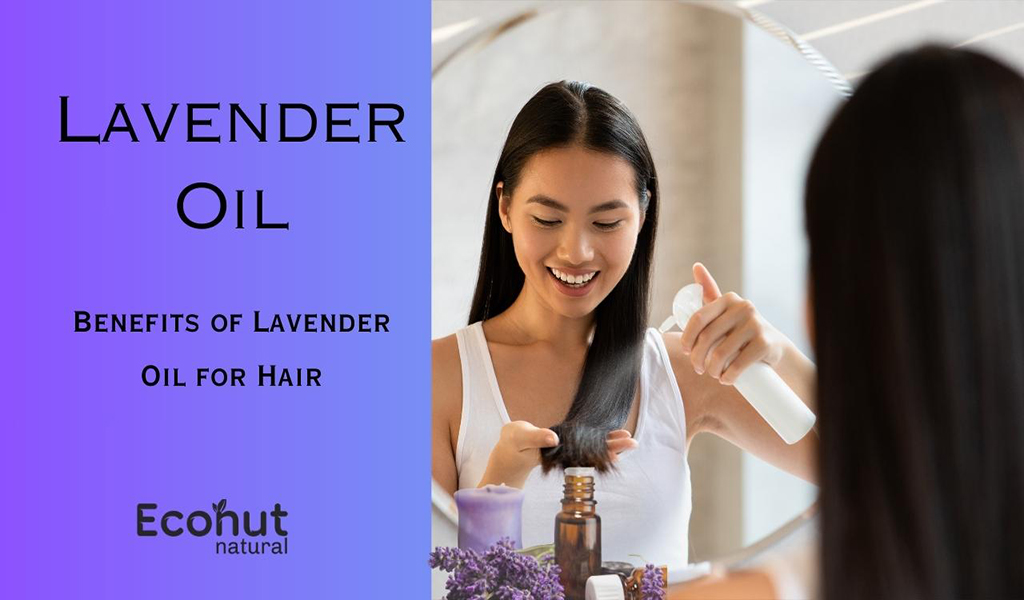Lavender Oil for Hair has been a long-standing and aromatic ingredient in beauty products for centuries, famous for its wide range. Lavender oil, extracted by distillation from the lavender plant, is a powerful essential oil with numerous benefits.
In addition to its pleasant aroma, lavender offers many benefits for its reputed ability to relieve headaches. However, it is worth noting that lavender and lavender oil can also benefit hair care. To understand lavender oil’s potential benefits and uses for hair, explore our informative guide.
What is Lavender Oil?
Lavender oil is the common name for the essential oil produced by the plant Lavandula angustifolia Mill. The plant is cultivated or harvested to obtain the oil for therapeutic use. Lavender oil is produced by passing a stream of steam over the top of the plant’s flowers.
Benefits of Lavender Oil for Hair
Here are numerous benefits of lavender oil that can help promote healthy hair.
Strengthens Hair:
Hair breakage is mainly caused by two factors: dryness and split ends. Your hair can become brittle and more susceptible to damage due to a lack of moisture. The uppermost cuticle layer is frequently raised by dryness, which causes more water to escape from the hair fiber and makes your hair porous and brittle. Your hair gets the additional moisture it needs from lavender oil, giving it life and elasticity. Your hair receives deep conditioning from this essential oil, creating a barrier around it. This strengthens your hair, enhances the texture, and reduces breakage.
Nourishment for Damaged Hair:
Lavender oil for hair growth regularly strengthens the hair. It benefits helps avoid problems like seasonal dryness and split ends that make hair brittle and prone to damage. Besides deep conditioning and strengthening, lavender oil acts as topical nourishment for damaged hair. When you massage it into your scalp and hair, it nourishes your hair strands and keeps your hair follicles healthy.
Promotes Hair Growth:
Lavender oil is being used in a variety of fats, masks, and hair growth products due to its capacity to stop hair loss. It is also believed to be effective in treating other types of alopecia, such as alopecia areata. The natural ingredients found in lavender oil improve the health of hair follicles, encourage new hair growth, and stop hair fall. It increases the subcutaneous blood circulation of the scalp. As a result, your hair roots will receive improved oxygen and nutrients.
Scalp Infection Prevention:
Another advantage of lavender oil that helps prevent infections on your scalp is that it has antibacterial and antifungal characteristics. Dandruff and scalp conditions like ringworm can be easily treated by mixing lavender
and regular hair oils. Additionally, dandruff is successfully treated with lavender oil. It aids in the treatment of alopecia areata because of its analgesic and anti-inflammatory effects.
Prevents Stress-Related Hair Fall:
Excess cortisol levels in the body cause stress-related hair loss. When you feel anxious, your adrenal glands release the hormone cortisol. Numerous hair strands rapidly enter the telogen or resting phase in those with telogen effluvium. These hair strands fall out in the short term due to gentle tugging and pulling during combing. Aromatherapy uses lavender oil, a known anxiolytic, to reduce stress. Regular lavender oil scalp massages can significantly lower hair cortisol levels. To lessen stress, mix a few drops of lavender oil with some water and use it to wash your hair.
Keeps Your Hair Smelling Great:
The constant build-up of sweat and sebum on the scalp can promote bacterial or fungal growth. As a result, your scalp and hair begin to smell, known as smelly hair syndrome. By massaging lavender oil into your scalp, you may stop the formation of bacteria and fungi and maintain the fresh scent of your hair all day.
It Is Antimicrobial:
According to this 2014 review, lavender also has antibacterial effects. This suggests that it helps limit the growth of bacteria and fungi. This can prevent typical hair or scalp problems when applied to the hair or scalp. In particular, it can protect against infections and an itchy or flaky scalp.
It Can Kill Head Lice or Help Prevent Them:
According to a 2011 study, lavender essential oil can help prevent head lice. It also removes head lice. The study compared lavender with tea tree oil, another essential oil. Although additional research is needed, using lavender oil may reduce the likelihood of aging. It may work even better when combined with tea tree oil.
It can Help Prevent Skin Irritation.
Sometimes, people turn to lavender as a natural remedy for skin irritations. Using essential oils can help with scalp dryness and irritation. In a 2012 study, lavender oil was used topically to treat skin ulcers and inflammation. It eases pain and speeds up the healing process.
How to Use Lavender Oil for Hair
Lavender oil can be used in hair in a variety of ways. Certain apps are better than others, depending on the benefits you want to gain. These are as follows.
Oil Can Be Massaged Into the Scalp
- Want to maximize the benefits of lavender oil for scalp and hair growth? Your scalp should be lightly coated in lavender oil. Lavender essential oil can be diluted with a carrier oil like jojoba or coconut oil. Equal amounts of carrier oil and essential oil should be combined.
- An ideal time to do this is after a bath or shower. After using it for 5 to 10 minutes, wash it off. For the best results, wrap your hair in a towel and let it sit overnight. Along with some scalp-healing properties, you’ll also notice how beautiful and relaxing the scent of lavender is.
- Daily or weekly oil massage is effective.
Add Oil to Your Hair Products
- Add the oil to hair products for specific scalp benefits, growth, fragrance, and calming effects. For example, a little lavender oil can be added to your shampoo, conditioner, or other product.
- To be safe, use only five drops per ounce of product. Before applying, add two to three drops to a dollop of hair product you already have.
- You can also include the oil in your homemade shampoo.
A Few Precautions
- Avoid over-oiling your products or scalp. Lavender oil can irritate the skin if used excessively.
- When using plain oils, always use a carrier oil to prevent irritation.
- If you develop a rash, hives, or dermatitis while using carrier oil, stop using it immediately. It indicates that you are sensitive to lavender.
- Never put lavender oil in your eyes or drink it directly. If you accidentally get any in your eyes, rinse immediately with cool water.
- Use or inhale lavender cautiously if you use medications that calm or depress the nervous system. These drugs have known interactions that can lead to drowsiness. Unknown interactions may also occur.
Conclusion
Topical application of lavender oil also strengthens hair follicles and promotes hair growth. Regular lavender oil reduces frizz and controls hair loss by conditioning the hair follicles. This aromatic oil also helps prevent hair fall by treating dandruff and pattern baldness. Moisturizing and Nourishing Effects on Hair and Scalp Lavender oil helps moisturize and nourish the hair and scalp with beneficial chemicals. It can help prevent dryness, reduce breakage, and promote overall hair health, which is crucial for optimal growth.
FAQs
Does lavender oil darken hair?
Yes, lavender oil aids in hair darkening. Regular application can enhance the texture and color of hair.
How often should lavender oil be used on hair?
If needed, lavender oil can be applied daily or once a week. Using it to damage hair every night can increase its shine. It can be applied as a weekly hair mask or daily as a serum.
How long does it take for lavender oil to start working on hair?
You may notice a change in your hair’s texture, appearance, or growth rate from one to three months after treatment.

